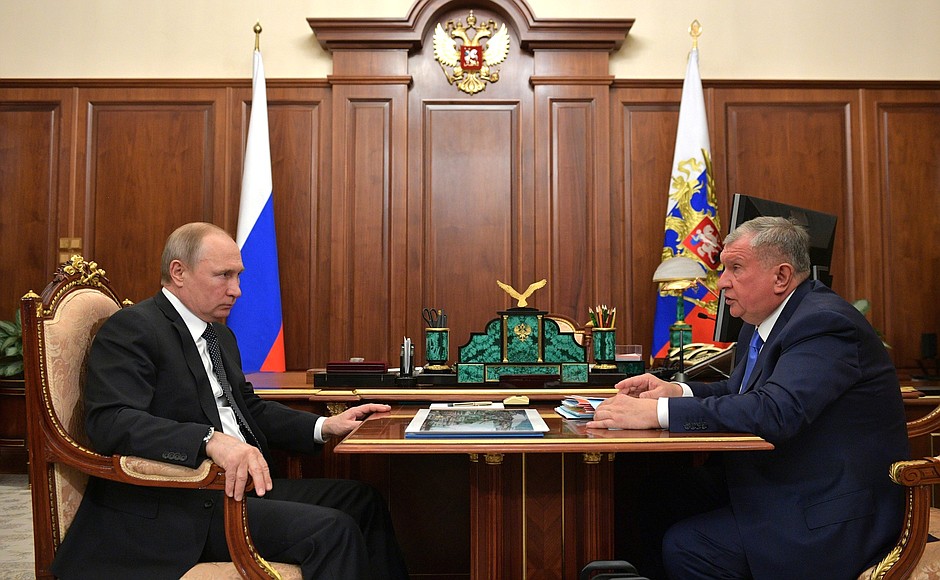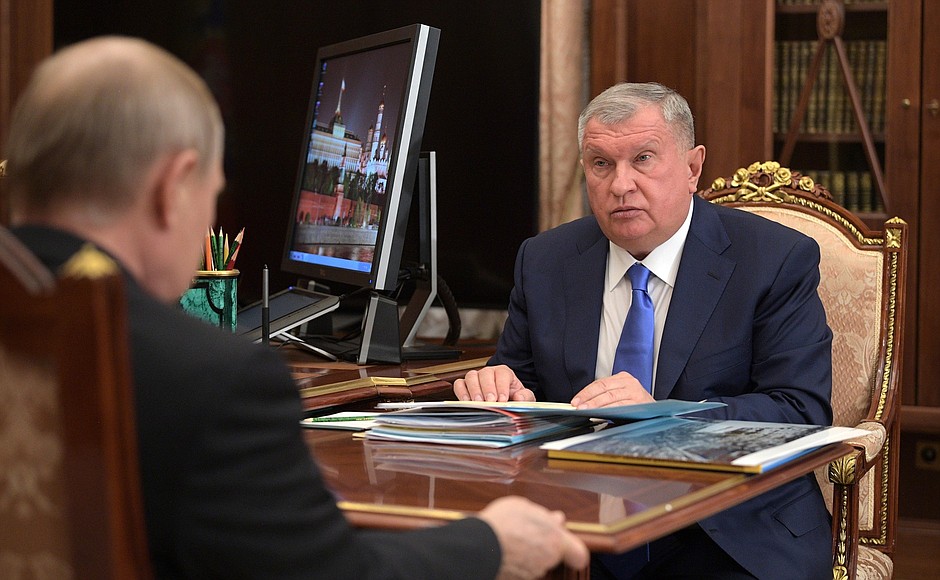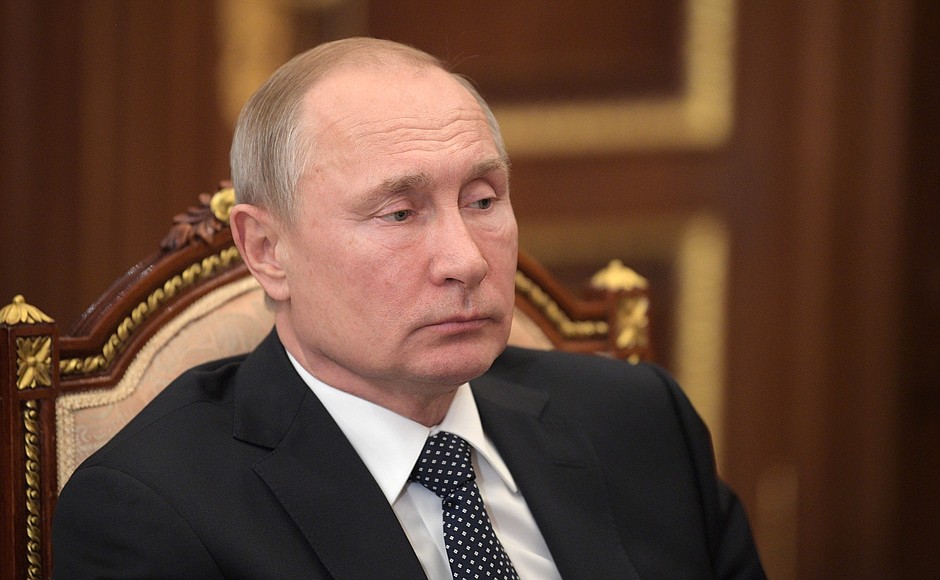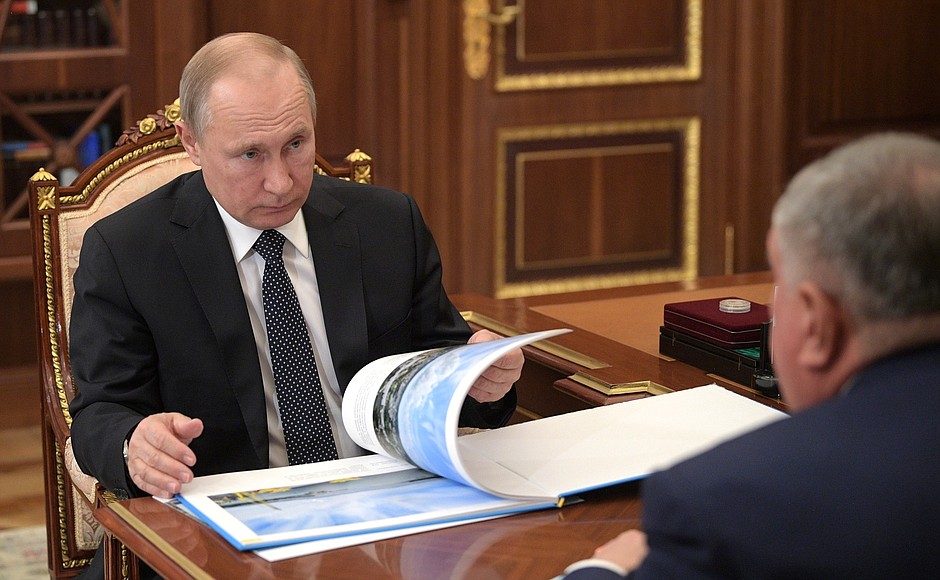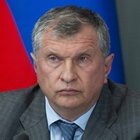President of Russia Vladimir Putin: Mr Sechin, let us begin with your company’s performance last year. And then I would like to hear about your plans in the Arctic, since you are implementing one of the largest shipbuilding projects in the Russian Far East, which is underway to promote operation in the Arctic, among other things.
Rosneft CEO Igor Sechin: Mr President, allow me to update you on the company’s key performance results in 2018.
Last year, the production of hydrocarbons reached a record-high level of 286 million tonnes of oil equivalent. We have also maintained production costs at the most competitive level in the industry: around $3.10 per barrel at the wellhead.
Rosneft is honouring its obligation to ensure a stable supply to the domestic market, as you have instructed us to do. We are aware of our role as a socially responsible supplier.
In 2018, we increased the supply of motor fuel to the market to 28.1 million tonnes or by nearly 4 percent compared to the year before.
Vladimir Putin: I have a question in this connection. Tell me about your relations with the Government in light of the budget manoeuvre, an increase in the mineral extraction tax (MET) and, consequently, the so-called reverse excise tax? Is this an effective mechanism?
Igor Sechin: We are working with the Government on this. The Finance Ministry is looking for sources to implement this reverse tax mechanism, the so-called adjustment coefficient (ratio). But we are keeping the prices down; we have only increased the value added tax by approximately 1.7–2 percent.
And now let me pass over to the key financial indicators. I would like to note that investment amounted to 936 billion, or almost one trillion, [rubles] in 2018, an increase of 1.5 percent while net profits grew by 150 percent to almost 550 billion rubles. The tax payments to the budget amounted to 4 trillion [rubles], also a record. In terms of this indicator, the company has emerged as the number one taxpayer in the Russian Federation. 225 billion rubles in net profits has been remitted to shareholders. This is also related to the commitments we have assumed in keeping with your instructions to remit as much as 50 percent of net profits to the dividend payments fund. Thus, the [Rosneft] company has joined the world’s top ten leading oil and gas industry operators. Generally speaking, we are the only Russian company to earn this rating.
In late February, you presided at a meeting on the Northern Sea Route and how to ensure cargo traffic. You have defined the objectives to develop the Russian Arctic. Currently, we are considering the possibility to create an Arctic cluster that will fully focus on bringing the cargo traffic in the Northern Sea Route to 80 million tonnes by 2024, as planned. This will be based on our own and prospective projects in the Arctic region, which may incorporate the Vankor cluster, Suzun, Tagul, the Lodochnoye deposit, and a number of geological exploratory projects in South Taymyr. For example, we have the Yermak project there we have launched jointly with BP, as well as the promising Zapadno-Erginsky area.
At the next stage, provided the resource potential is confirmed, the cluster we are creating may also include the East Taymyr assets located in the Khatanga area. We have conducted initial geological prospecting and exploration there and discovered a field for some 80 million tonnes. But the main resource there is on dry land. We continue the work in this region.
The Arctic cluster will be able to produce oil by 2024. The first stage will be accomplished by 2024 and production is likely to rise to 100 million tonnes by 2030. The joint assets will be a centre attracting strategic investors. We have been working in this vein. Major Western and Southeast Asian investors have displayed an interest. This will certainly create conditions for an accelerated resource deployment as well as for a comprehensive development of related industries.
Of course, effective development of the Russian Arctic zone requires support. You mentioned this during the meeting. Creating an investment-friendly environment is of paramount importance if we want to be able to launch projects. This primarily concerns taxation, regulatory terms and ensuring guaranteed stability of these projects for the entire period of their life.
When making a decision, we must be confident that the rules will not change for the entire duration of the project, be it 30 or even 50 years. This will be a prerequisite for bringing in additional investors, especially from outside.
Given the availability of alternative logistical options, the Northern Sea Route should be as economically viable for the projects as alternative routes. In this regard, we formulate our proposals, submit them to the Government, and we will continue to do this work.
In accordance with your instructions, work is underway at the Zvezda shipyard to promote the development of the Northern Sea Route. This is where we are at the moment (shows photos). Work is underway. This is a prefabricated large-block assembly workshop, which is currently being built. This is a dry dock. This is what it looks like right now.
Vladimir Putin: The largest one.
Igor Sechin: You saw it in September. This is the drained area.
This is one of the residential quarters, the construction of which is nearing completion. This is another one. In conjunction with the Iceberg Central Design Bureau, the shipyard has begun preparations for the construction of the Leader pilot icebreaker. Rosneft’s order book with Zvezda now includes 25 vessels, and binding shipbuilding contracts have been concluded to build them.
Vladimir Putin: How much do you need to make sure that the shipyard operates steadily and profitably?
Igor Sechin: We need about 160.
Vladimir Putin: How much do you have now?
Igor Sechin: As I mentioned earlier, Rosneft has laid down the keel for 25 vessels, including four supply vessels of reinforced ice class and 10 Aframax vessels using natural gas motor fuel just for transporting raw materials along the Northern Sea Route. We began the construction of 10 shuttle tankers with the deadweight of 110,000 tonnes which are part of a new project. The total deadweight of the vessels commissioned by Rosneft exceeds 2 million tonnes, and most of them are designed to operate in the Arctic. We have confirmed contracts for 36 vessels. In addition to orders by Rosneft, it also includes Gazprom with five ships, Sovkomflot with five ships and Rosmorport with one ship.
Vladimir Putin: Contracts with NOVATEK were ready to be signed as well.
Igor Sechin: These contracts are in progress. So far, NOVATEK has only concluded contracts to reserve capacities for future construction. They are discussing financial terms. We hope that the contracts will be signed eventually. Work is underway, but progress is slow. The consumer is a high-level professional, so, clearly, this is a particularly complex order. We are now trying to come up with financial arrangements which will allow us to compete successfully with South Korean builders, although they will still participate in the construction of these vessels during stage one of the construction.
Vladimir Putin: Report back to me on the progress of the work.
Igor Sechin: We will make sure to do this, Mr President.
Now a few words about social issues. As I have reported, over 2,000 people work at the shipyard. The average salary is 87,000 rubles. The workforce will exceed 10,000 when design capacity is reached. This is why the housing construction project is being carried out on your instructions. We should finish over 5,000 flats by 2023. This year, 1,400 will be completed. All employees will be provided with housing. We will be ready to make a regular report at the Eastern Economic Forum on the status of the projects needed to complete the shipyard.
Vladimir Putin: In addition to ensuring a portfolio of orders to keep the shipyard running stably, we also need personnel, and here I mean high-end professionals we will have to look for in virtually all parts of the country. I have discussed this with you. What is being done to attract highly trained specialists?
Igor Sechin: Mr President, we are working in every area. We agreed with Deputy Prime Minister Tatyana Golikova to establish vocational technical schools for the training of qualified workers, primarily welders. We are also creating an engineering cluster. We are working with the most advanced companies in the world including Western European dockyards and equipment suppliers from all over the world. With this technology, we are able to attract highly qualified personnel.
Regarding steerable propellers, we are now building a plant to manufacture them, we do need qualified workers. We are finding them and attracting them with housing and salaries. Everything is going well for now.
Vladimir Putin: What about heavy sheet steel for bulk ships? What did you decide to do after all?
Igor Sechin: We are looking for a solution with the Ministry of Industry and Trade on this.
Vladimir Putin: You should also consider a steel mill. Obviously, metal sheet of this size cannot be transported by rail; so many things will have to be produced on site.
Igor Sechin: This is true. We are considering several options. We need 24 metre-long metal sheet sections to compete with South Korean producers in full scale assembly. Metal sheet of this size cannot be transported by rail because of the limitations on curves, tunnels and platforms.
So we have two main options: first, to build a steel mill near the shipyard, and, second, to consider the alternatives offered by our largest steel producers, which have become interested in this project. We are now working on the final solution with the Ministry of Industry and Trade.
Vladimir Putin: This work should be coordinated with all other stages of the plant’s construction.
Igor Sechin: It will, Mr President.
Vladimir Putin: Ok.
<…>
